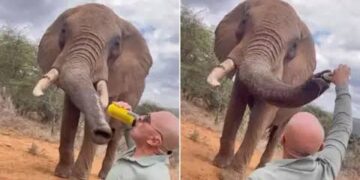By Emmanuel Nduka Obisue
Kenya’s reputation as a leading wildlife destination has come under scrutiny after a viral video showed a tourist forcing an elephant to drink beer inside a private nature reserve. The disturbing incident has triggered public outrage and renewed calls for stricter enforcement of wildlife protection rules.
The elephant, identified as Bupa, a 44-year-old male living in the Ol Jogi conservation in central Kenya, was filmed having Tusker beer poured into its trunk by a Spanish visitor. The clip, which was later deleted from Instagram, was captioned: “Just a tusker with a tusked friend”.
The Kenya Wildlife Service (KWS) has since launched an investigation into the matter, while conservationists and Kenyans on social media condemned the act as yet another example of reckless tourist behavior that endangers the country’s treasured wildlife.
Ol Jogi, the reserve where the video was recorded, markets itself as a safe haven for endangered species. However, this is not the first time tourists have been caught disturbing animals. Just last week, footage emerged of vehicles blocking wildebeest during their annual migration at the Maasai Mara, forcing some into crocodile-infested waters.
Tourism and Wildlife Cabinet Secretary Rebecca Miano has announced new measures to address the rising cases of misconduct, including tighter park regulations, more ranger patrols at sensitive sites, and stricter accountability for tour operators.
“Kenya’s tourism future is anchored in our ability to protect both visitors and wildlife. We must act decisively to preserve the Maasai Mara’s integrity, uphold visitor safety, and demonstrate Kenya’s unwavering commitment to conservation,” Miano said.
The incident has fueled wider debate about responsible tourism, raising concerns that the country’s global image as a conservation leader could be undermined if such behavior goes unchecked.




































